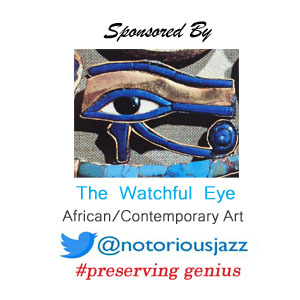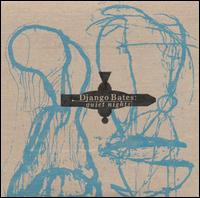
Daily Dose Of Jazz…
Django Bates was born Leon Bates on October 2, 1960 in Beckenham, Kent, England where he attended Sedgehill School. While at this school, for six years he also attended the Centre for Young Musicians in London, England, where he learned trumpet, piano, and violin. In 1977 he studied at Morley College. The following year he enrolled at the Royal College of Music to study composition but left after two weeks.
He founded Human Chain in 1979 and, in the 1980s, he rose to prominence in a jazz orchestra called Loose Tubes. In 1991, Django started the 19-piece jazz orchestra Delightful Precipice. He also assembled the Powder Room Collapse Orchestra and created Circus Umbilicus, a musical circus show. As a sideman he was a member of Dudu Pukwana’s Zila, Tim Whitehead’s Borderline, Ken Stubbs’s First House, Bill Bruford’s Earthworks, Sidsel Endresen, and in the bands of George Russell and George Gruntz.
As an educator, he has tutored at the Banff Centre jazz program, and was appointed Professor of Rhythmic Music at the Rhythmic Music Conservatory in Copenhagen. Bates was appointed visiting professor of jazz in 2010 at the Royal Academy of Music in London, and the next year was appointed Professor of Jazz at HKB Bern Switzerland.
He has performed with Michael Brecker, Tim Berne, Christian Jarvi, Vince Mendoza, David Sanborn, Kate Rusby, and Don Alias. Pianist, keyboardist, tenor hornist Django Bates continues to perform and record.
More Posts: bandleader,educator,history,instrumental,jazz,keyboards,music,piano,tenorhorn
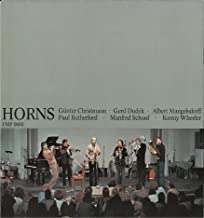
Daily Dose Of Jazz…
Gerhard Rochus “Gerd” Dudek was born September 28, 1938 in Wrocław, Poland. He studied clarinet privately and attended music school in the 1950s before joining a big band led by his brother Ossi until 1958.
During the early 1960s, Dudek played in the Berliner Jazz Quintet, in Karl Blume’s group and in Kurt Edelhagen’s orchestra until 1965. He then became interested in free music and joined Manfred Schoof’s quintet. He took part in the first sessions of The Globe Unity Orchestra in 1966, and played with them at various times into the 1980s.
He also worked with many other European free musicians and composers, including Alexander von Schlippenbach, Loek Dikker and The Waterland Ensemble And European Jazz Quintet.
He is best known for his work with Manfred Schoof, Wolfgang Dauner, Lala Kovacev, the Globe Unity Orchestra, Berlin Contemporary Jazz Orchestra, Albert Mangelsdorff, Don Cherry and George Russell. Tenor and soprano saxophonist, clarinetist and flautist Gerd Dudek continues to be involved in music.
More Posts: clarinet,flute,history,instrumental,jazz,music,saxophone
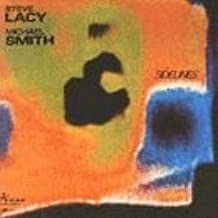
Daily Dose Of Jazz…
Michael Joseph Smith was born August 13, 1938 in Tiline, Kentucky. At the age of 6 years, he gave his first concert of original solo piano music in Nashville, Tennessee. After serving in the United States Navy, he studied electro-acoustic music, moving between Boston, Massachusetts and New York City. He became involved with the New England Conservatory of Music and the Juilliard School and developed a philosophy and notation form of his original music, titled Geomusic, and composed works with this method for various chamber groups, solo piano, and symphony orchestra.
Embarking on his first European concert tour in 1970, he completed his initial recordings in Italy and developed an interest in Jazz and improvisation. Moving to Paris, France in 1972 he had several concert tours and recordings in Western Europe and America with Steve Lacy, Anthony Braxton and others. In 1975 he began recording various albums in Europe and America and toured, mostly solo, Italy, Poland, East Germany, Hungary, Western Europe, South America and Scandinavia over the next year. 1977 saw Michael admitted to the Swedish Composers Society andtwo years later he became a member of the International Society for Contemporary Music.
A return to the United States landed a composer-in-residence in Atlanta, Georgia and completed three ballet projects, has been awarded numerous cultural prizes and stipends in Europe and Scandinavia, and has composed scores for films, television projects, and music for 10 major ballet works.
He has lectured in Atlanta, Boston, Massachusetts, Brunswick, Maine and in Beijing and Xian, China. He has founded three music corporations and has been inducted in the Royal Swedish Academy of Music’s Swedish Musical Heritage project as a “living musical heritage” of Sweden. Pianist and composer Michael Smith, who has released 55 recordings of original compositions in 17 countries and has three film portraits of his life, continues to remain active.
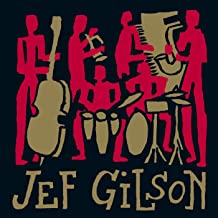
Daily Dose Of Jazz…
Jef Gilson was born on July 25, 1926 as Jean~François Quiévreux in Guebwiller, France. As a clarinetist he began playing with Claude Luter in the Boris Vian band. After that stint he switched to the piano. The experience of the Dizzy Gillespie Big Band led him to become an arranger and big band leader. In his band played, among others Bill Coleman, Bernard Vitet, Jean-Louis Chautemps, François Jeanneau, Michel Portal, Jean-Luc Ponty, Bernard Lubat, Lloyd Miller and Henri Texier.
For a time he was musical director of the vocal sextet Les Double Six. Gilson’s free jazz recordings did not materialize into success, and in 1968 he temporarily went to Madagascar. His 1971 return saw him concentrating first on ethno jazz, then total improvisation. In 1973 he founded his label Palm, and released recordings with his orchestra Europamerica, and with Butch Morris. For this more arranged record, which started reflecting his achievements of free jazz, he was awarded the 1978 Prix Boris Vian.
Up to his final days he lived withdrawn in Ardèche, France. Pianist, arranger, composer and big band leader Jef Gilson passed away on February 5, 2012.
More Posts: arranger,bandleader,composer,history,instrumental,jazz,music,piano

Daily Dose Of Jazz…
Rodrigo Amado was born in Lisbon, Portugal on July 15, 1964 and began studying the sax at the age of 17, briefly at the Hot Club Music School of Lisbon and with mentors Carlos Martins, Pedro Madaleno, and Jorge Reis.
With diverse musical interests, he explored improvisation in other genres, including his work with his various ensembles like the Lisbon Improvisation Players and the Motion Trio with Miguel Mira and Gabriel Ferrandini. He is an in~demand studio player on numerous recorded projects.
He started his own label Clean Feed in 2001, with brothers Pedro and Carlos Costa, before leaving the imprint in 2005 to start a second label, European Echoes. Also an accomplished professional photographer, Amado continues to be a bright light on the Portuguese and international improvisational jazz scene.
Saxophonist Rodrigo Amado continues to specialize in free-form, composition-in-the-moment jazz, and his various projects and trios have given him an international following.
More Posts: bandleader,composer,history,instrumental,music,saxophone


